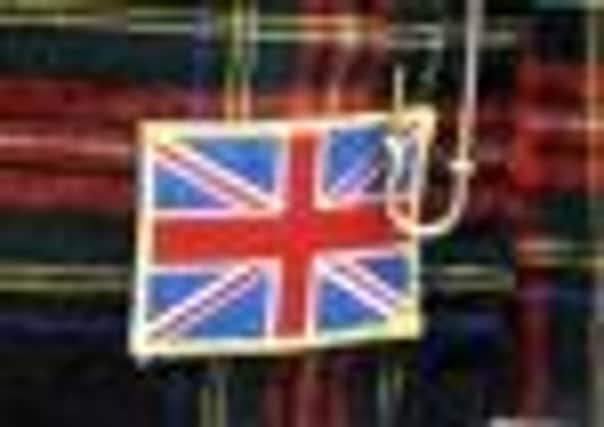Mike Elrick: Independent and British? SNP just can’t have it both ways


Clarkson, cheerleader of the Little Englander mentality, said not so long ago he would stand on Hadrian’s Wall with a “teary handkerchief”, saying “good riddance” to the Scots if the nation opted for independence, believing that “secretly deep down, every English taxpayer would be rather glad if they did”.
No doubt Salmond would wave back o’er the Border and dance a wee jig in delight, keen as he is to talk up the benefits to England if Scotland were to go its own way. But it would be dangerous to view Messrs Salmond and Clarkson’s shared antipathy and ambivalence to Scotland’s continued place in the United Kingdom as representative of wider public opinion.
Advertisement
Hide AdAdvertisement
Hide AdWhile both may be very vocal and no-one could doubt the strength of their opinions, it would be a stretch to argue that they speak for the majority when it comes to Scotland’s future in the Union – as nearly every substantive poll of public opinion over the last 20 years makes clear. Uncomfortable as it may be to Little Englanders and their Scottish counterparts, most Scots at this juncture still want to remain part of UK PLC and most English people still want Scotland to stay in the UK.
In a speech on national identity and what it means to be British last week, Labour leader Ed Miliband made the case for the continuance of the United Kingdom in this context, following the countrywide celebrations for the Queen’s Diamond Jubilee, arguing that Scotland and England were “intertwined” economically, culturally and socially and that the beauty of the United Kingdom is that citizens can enjoy plural identities that would be denied them if Scotland was to leave the UK.
No doubt it came as music to the ears of some also to hear Miliband warn that Scots would not be British if the nation votes for independence. Others no doubt objected to an English Labour leader raising this uncomfortable truth.
But the reality is, no matter how much the SNP asserts that independence would not alter the fundamental relationship between England and Scotland, it will. And Ed Miliband was right to say so.
Some nationalists, like actor Alan Cumming, may genuinely believe that after ditching the Act of Union Scots will still wave the Union flag proudly here and overseas. And Scottish Government minister Alex Neil may, after independence, still consider himself at least in part British, as he claims. But if you follow through the logic of their position, it doesn’t stand up to close scrutiny.
You cannot argue for self-determination and an independent Scotland that stands on its own two feet in the world only to fall back on British symbolism and a shared British identity when it suits. This amounts to pick ’n’ mix nationalism. It is a world view that fails to take into account what would be an irrevocable change in the relationship between Scotland and the rest of Britain.
As Labour’s Scottish leader, Johann Lamont, has made clear, you cannot propose the most momentous constitutional change in these isles in more than 300 years and claim simultaneously that everything will stay the same.
The SNP makes soothing noises about our two nations taking forward a “social union” based on shared economic interests, cultural ties, family and friendship and geographical proximity. But the fact remains Scotland overnight would become a foreign country to the rest of the UK if independence becomes a reality. Friends and family living on one side of a border or another would be citizens of another state. That would be a seismic and polarising change. That’s not scaremongering. That would be the reality of creating an independent state.
Advertisement
Hide AdAdvertisement
Hide AdIt’s undoubtedly the case that practical ties would remain in place after a Yes vote for Scotland to leave the United Kingdom, but there will be a change in how people on either side of a border that suddenly matters will view the inhabitants of the other country, even if we continue to share a monarchy and a currency.
Interests will diverge. Far from a relationship of equals, it’s difficult to see how “equal” that relationship would be given the size, population and economic advantages England would have over its northern neighbour. And would the much-trumpeted Salmond vision of a “social union” based on shared history and culture count for anything if governments north and south diverge on issues such as immigration policy or taxation?
It’s hard to envisage how an independent Scotland and the remaining constituent parts of the UK could remain good neighbours if they become rivals when it comes to attracting and retaining jobs and maintaining economic prosperity. Neighbours yes, good and equal friends, perhaps not.
Sixty-eight years ago this month, my late grandfather – a Londoner who settled in Aberdeen – was part of the largest naval armada in history; his ship, crewed by Scots, English, Welsh and Irish servicemen, was part of the D-Day landings to free occupied Europe from Nazi domination.
After the war he returned to the north- east of Scotland to bring up a family. He never forgot his English roots but was equally proud to be Scottish and yes, British. He would have viewed plans for Scotland to leave the UK with dismay, going against everything he and his comrades fought for and endured.
I now live in London but return to Aberdeen regularly and have family across England and Scotland. It would be a sad day if I were forced to choose between being Scottish and British or to view my English relatives as citizens of another country. I hope that day never comes, and the Clarksons and Salmonds of this world do not get their way. «
» Mike Elrick is a former adviser to John Reid and the late Labour leader John Smith